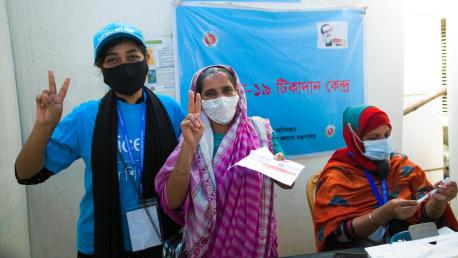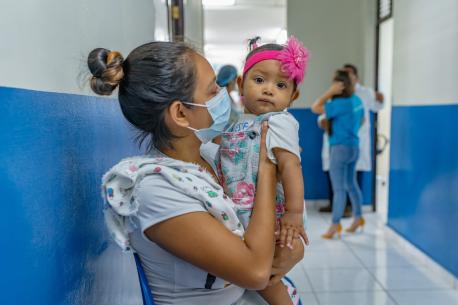COVID-19 Pandemic Hits One-Year Mark
On March 11, it will be a full year since the outbreak of the novel coronavirus was officially declared a pandemic by the World Health Organization — and well over a year since UNICEF launched its emergency response to protect children from the fallout.
As vaccination campaigns roll out worldwide — bringing new hope to those devastated by the disease, directly or indirectly — we look back at key moments.
Early days: a new and deadly virus strikes in Wuhan, China
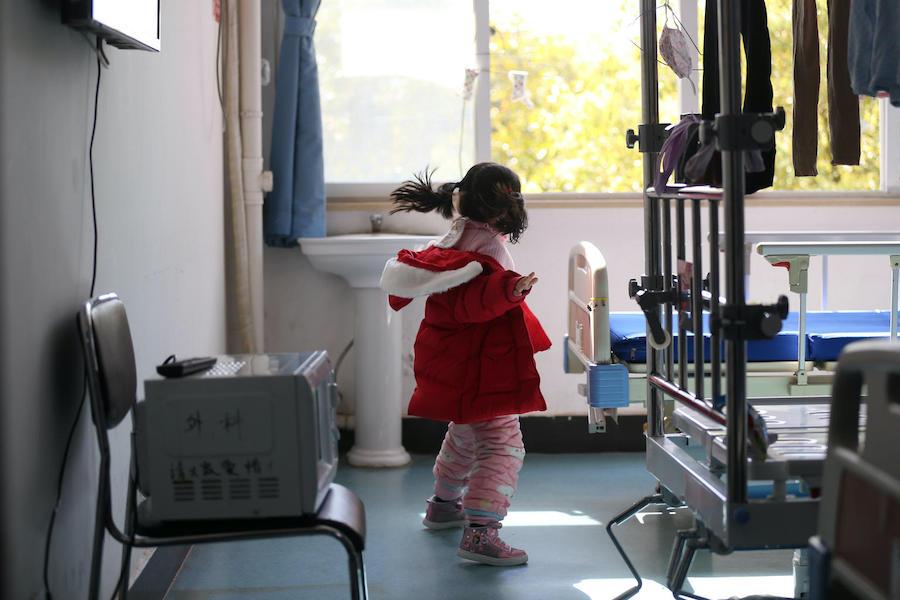
© UNICEF/UNI304655/Cui
The discovery of severe acute respiratory syndrome coronavirus 2 was first reported in Wuhan, the capital of Hubei Province in Central China, on Dec. 31, 2019. By Jan. 23, 2020, the city was on lockdown, and tens of thousands more cases of the novel coronavirus were reported in the weeks that followed. Above, 5-year-old Yuanyuan (name changed) was left alone after her parents and grandparents fell ill with COVID-19, so hospital administrators found an empty room for her to live in with a volunteer.
Personal Protective Equipment (PPE) is rushed to the front lines
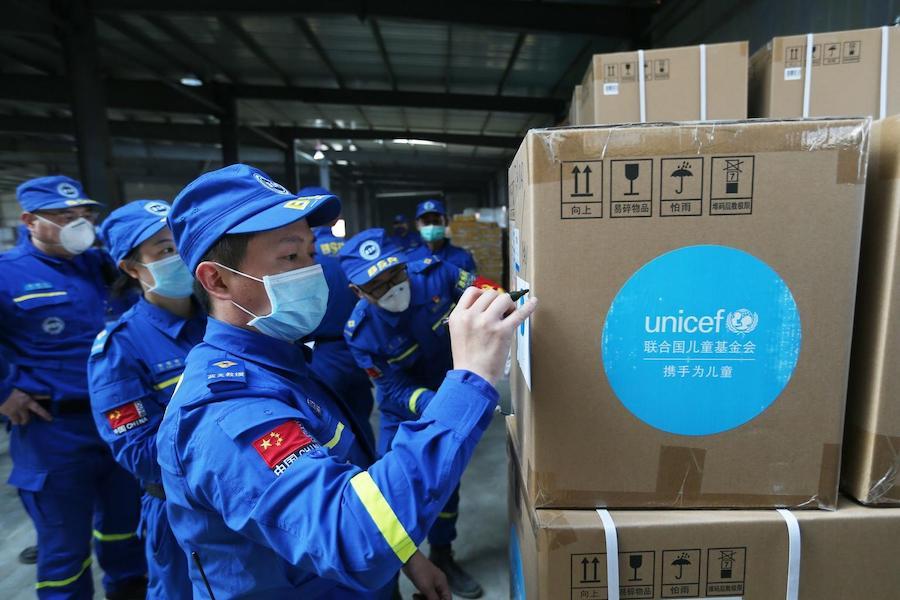
© UNICEF/UNI312245
Above, volunteers for the Hubei Charity Foundation in Wuhan receive delivery of PPE and other items needed to support the local response to the coronavirus outbreak. Even before COVID-19 had been declared a global health emergency, UNICEF had shipped six metric tons of medical and hygiene supplies to health workers fighting on the front lines — and has shipped hundreds of millions of items since.
WHO calls it: COVID-19 is a pandemic
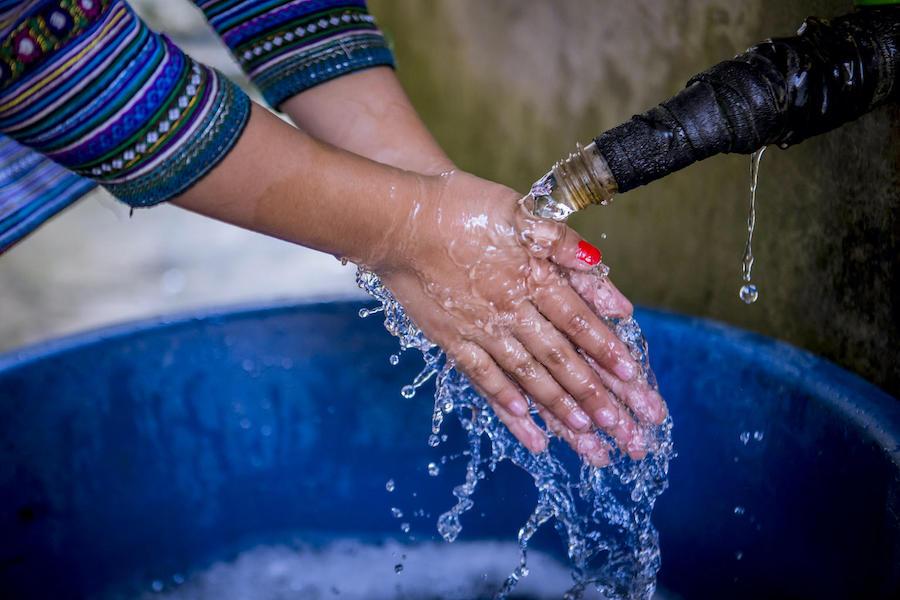
© UNICEF/UNI220517/Viet Hung
On March 11, 2020, WHO declared COVID-19 a pandemic due to its spread across countries and continents. UN Secretary-General António Guterres described the announcement as a call to action “for everyone, everywhere” to double down on efforts to contain it. UNICEF — amid increasing concerns about the potential impacts of the outbreak and related control measures on children and families — is committed to mitigating those impacts and protecting the most vulnerable. Enabling regular handwashing — with soap — has become even more critical, and UNICEF has ramped up water, sanitation and hygiene programs with partners.
Information campaigns launch to raise awareness, mobilize communities around infection prevention and control
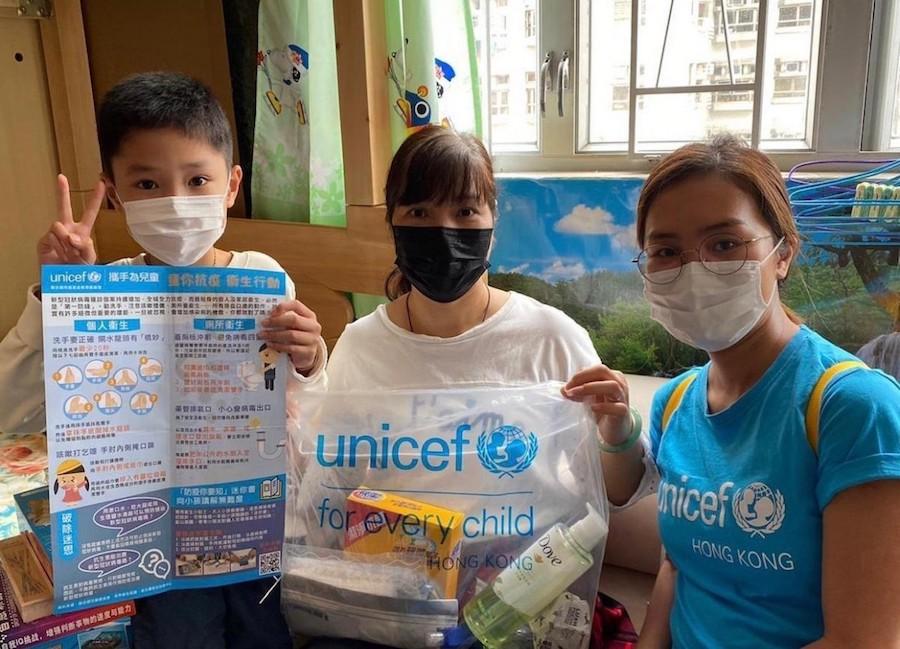
© UNICEF/UNI314076/Chan
Distributing supplies and health information to vulnerable families and communities has been a critical component of UNICEF's global COVID-19 response since the beginning. It's a grassroots effort, involving community outreach and door-to-door distribution of hygiene kits and messaging on effective prevention measures. Above, a UNICEF-trained volunteer in Hong Kong conducts a home visit in a low-income neighborhood. Below, in the village of Morovine, in north Côte d'Ivoire, a UNICEF staff member explains to a young boy the importance of washing hands and wearing a mask to protect against the novel coronavirus.
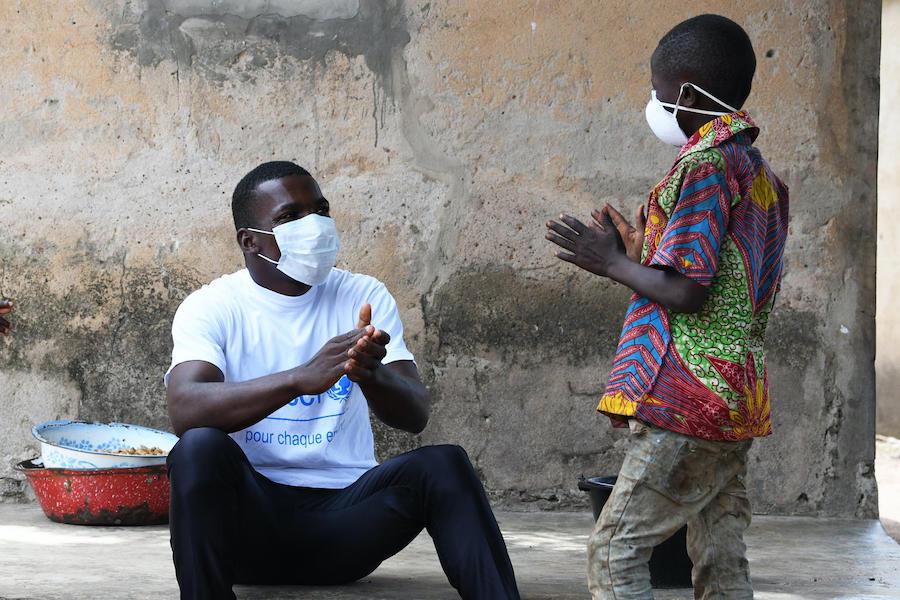
© UNICEF/UNI325632/Dejongh
Schools shut down, affecting 91 percent of the world’s students — 1.6 billion kids in all
© UNICEF/UN0352070/Makyn
School closures related to the COVID-19 pandemic forced kids like Joel, above in Jamaica's Westmoreland parish, to switch to remote learning at home. This is especially challenging for students who don't have an Internet connection at home or even a table to sit at.
The lockdowns have been devastating for children's mental health, nutrition and overall well-being. The most vulnerable kids, for whom school is also a safety net and support system, face higher risks of gender-based violence, exploitation and abuse. UNICEF prepared a road map for bringing kids back into the classroom — safely — and continues to urge governments to make reopening schools a priority.
UNICEF has also been working with national education authorities in many countries to help develop and expand alternative remote learning programs for kids while schools remain closed. Eleven-year-old Umuhoza, below, tunes in to Radio Rwanda for her daily lessons.
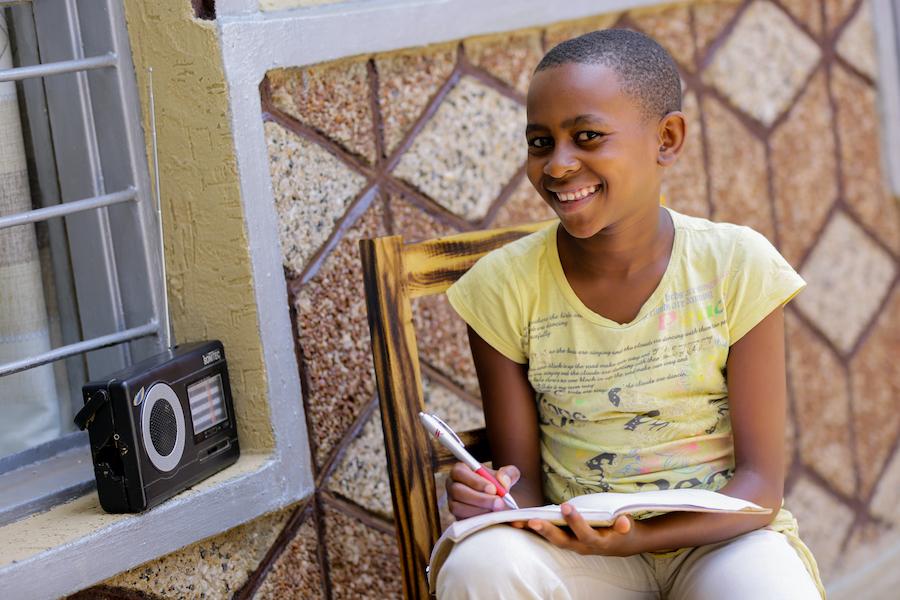
© UNICEF/UNI319832/Kanobana
Fears mount over kids missing out on essential care — including routine immunizations
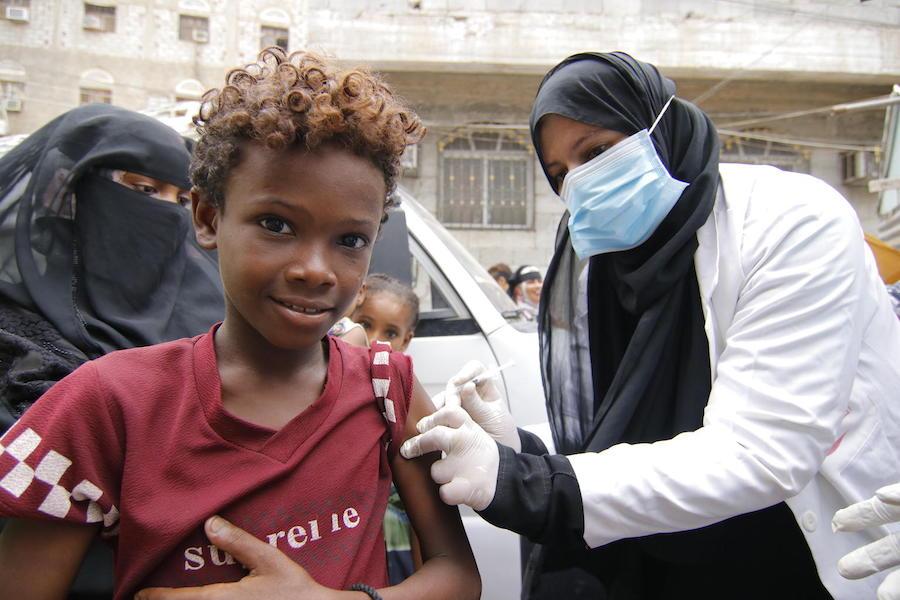
© UNICEF/UNI349184/Fahdl
A May 2020 study in The Lancet warned that with kids missing out on routine immunizations and other basic health care — due to services being suspended, and/or parents keeping kids home out of fear of exposure — the pandemic could lead to more child deaths from preventable causes.
In response, UNICEF has been intensifying its support of country efforts to make sure kids get vaccinated — with necessary pandemic precautions in place — providing resources and other assistance to shore up overburdened health systems. Above, Mohammed, 13, is vaccinated against diphtheria at the UNICEF-supported Khawr Meksar clinic in Aden, Yemen. Below, Shumaila, a UNICEF-trained vaccinator in Lahore, Pakistan, inks a child's finger showing that the child is now protected against polio.
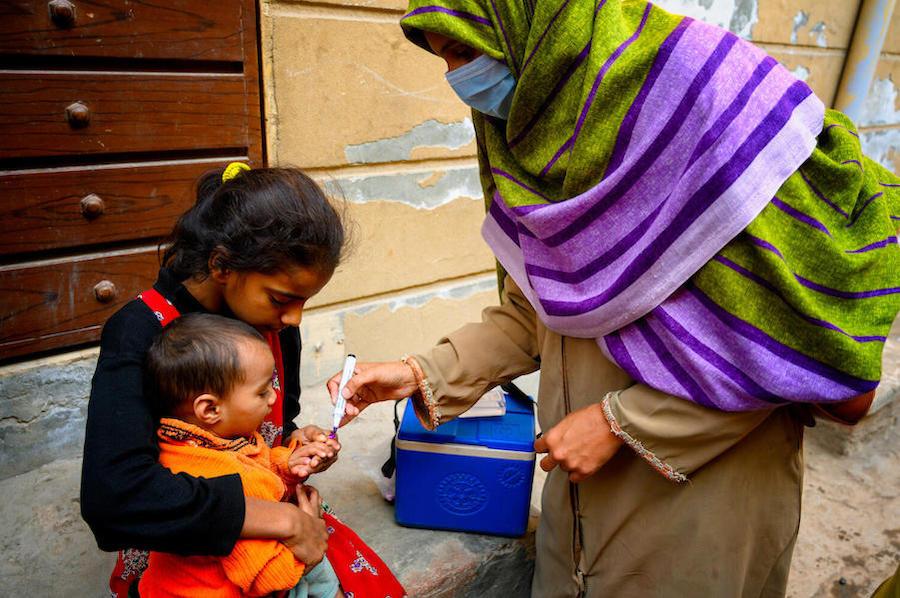
© UNICEF/UN0399481/Bukhari
UNICEF urges action to avert a 'lost COVID generation'
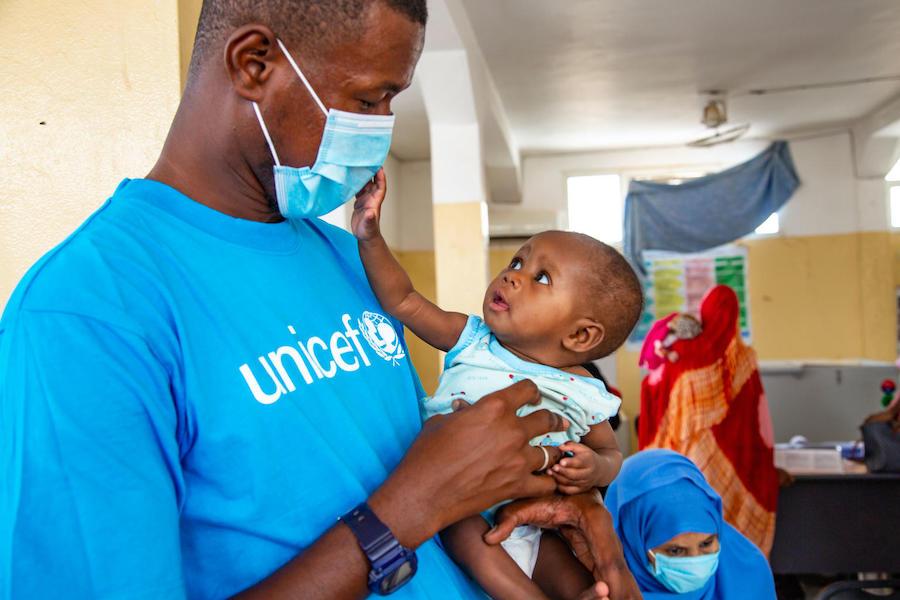
© UNICEF/UNI344647/Pouget
With the pandemic's socio-economic shocks hitting vulnerable children and families the hardest, UNICEF offers a six-point plan for 'averting a lost COVID generation' — a plan that includes restoring essential services children need to survive and thrive — in health care, nutrition, education, water and sanitation, and child protection — while reimagining a better post-pandemic world.
Red flags have been raised on many fronts, citing recent UNICEF data from 135 countries. For example, it is estimated that 132 million more people — including 44 million children — could go hungry due to rising food insecurity, and that wasting and acute malnutrition rates among children could jump as high as 14 percent.
UNICEF's nutrition interventions include community outreach and education around breastfeeding and infant and child feeding practices, with an emphasis on early screening and treatment for severe malnutrition. Above, a UNICEF nutrition specialist holds a baby who is being treated for malnutrition at a rehabilitation center in Nouakchott, Mauritania. Below, a child is weighed at a community health post in Sidorejo village, Central Java province, Indonesia, as part of a routine health and nutrition check; UNICEF support has helped keep key services going in the village as local resources are diverted to the COVID-19 response.
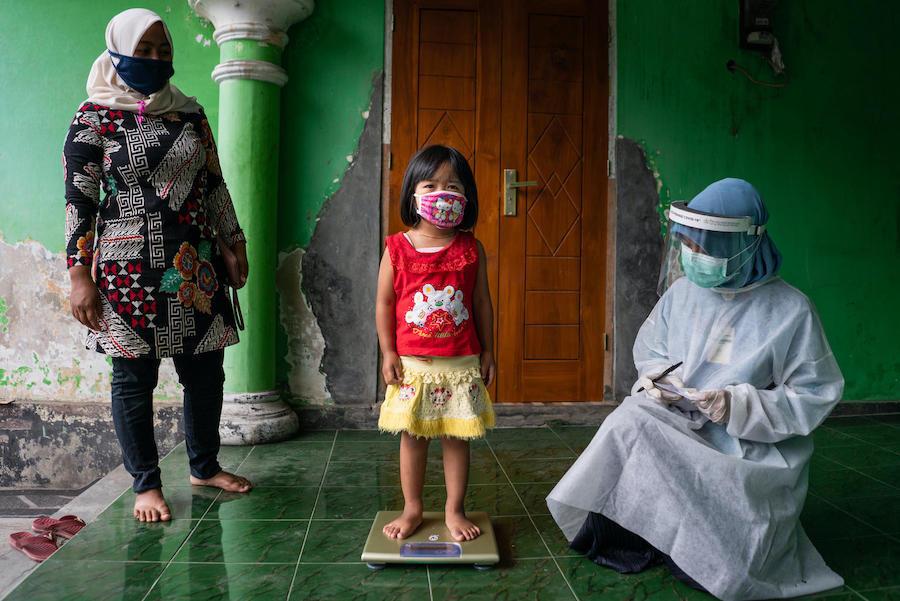
© UNICEF/UNI350138/Ijaza
Attention focuses on mental health
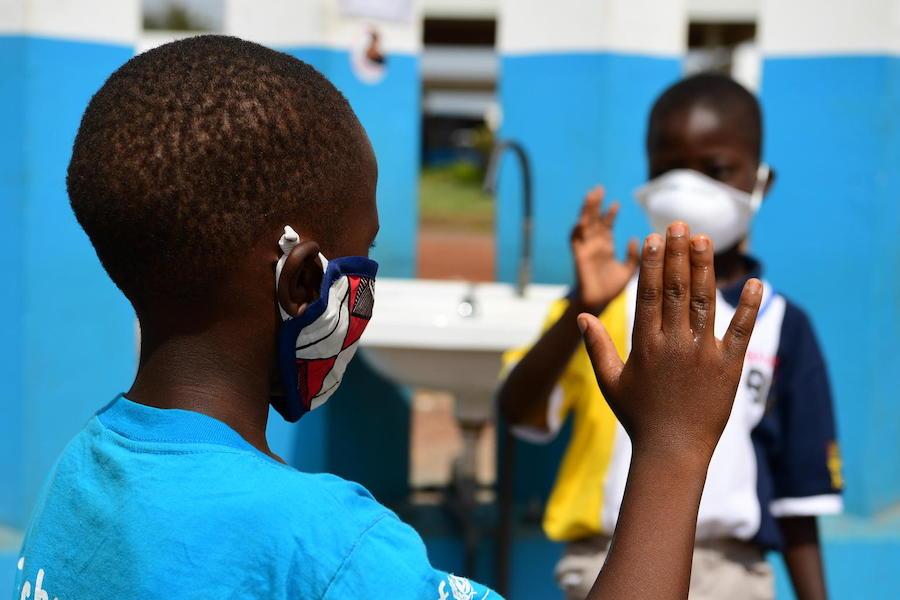
© UNICEF/UNI325661/Dejongh
A week shy of the pandemic's one-year anniversary, UNICEF reported that more than 330 million youngsters — at least 1 out of 7 — have been stuck at home for at least nine months, putting their mental health and well being at risk.
In her open letter dated Feb. 16, UNICEF Executive Director Henrietta Fore named investing in mental health one of five opportunities to do better for children. "COVID-19 has turned lives upside-down, disrupting comforting and familiar patterns like going to school and playing outdoors," Fore wrote. "For adolescents, lockdown has deprived them of the social and peer connections that are so crucial at this time of life. And for children affected by the trauma of violence, neglect or abuse in the family, the lockdown has stranded many behind closed doors with abusers and without the support they would normally find in school and with their extended families and communities." Meanwhile, mental health services have been disrupted or halted in 93 percent of countries worldwide due to the pandemic, according to WHO.
UNICEF has called on countries to expand mental health services and support for young people in communities and schools, and to build on parenting programs to ensure that children are getting the support and protection they need at home. Above, two young friends in Korhogo, in north Côte d'Ivoire, greet each other from a safe distance.
Countries mobilize for mass vaccinations
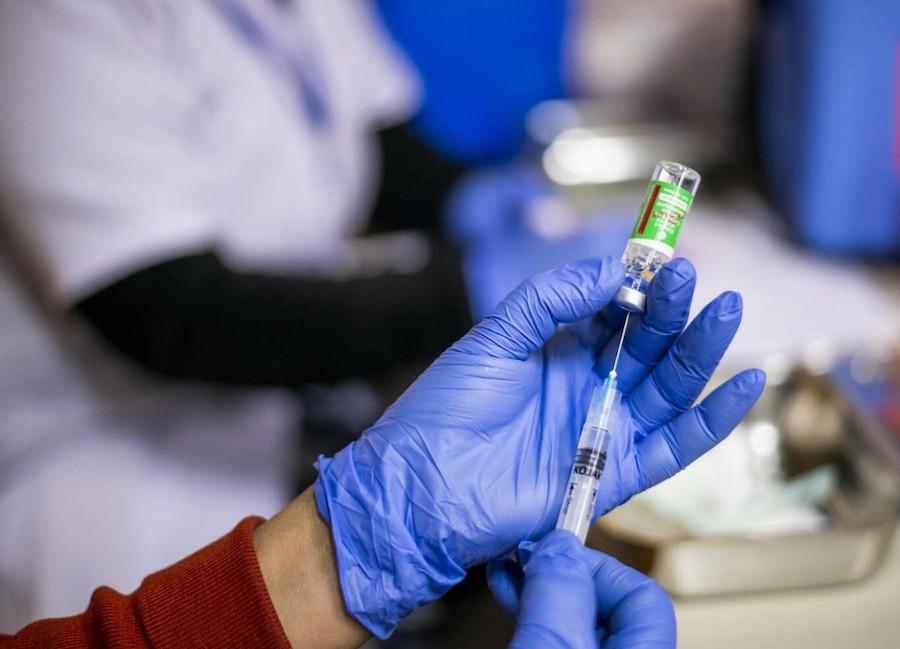
© UNICEF/UN0402782/Reddy
With COVID-19 vaccines approved and authorized for use, the largest vaccination drive in history is underway. In mid-February, UNICEF and its COVAX partners announced plans to distribute the first tranche of vaccines to 18 low-income countries, adding that more supply agreements were forthcoming and that leading airlines had committed to supporting vaccine deliveries. For the past several months, UNICEF has been procuring and pre-positioning single-use syringes and other critical supplies in preparation. Above, a nurse in New Delhi, India, prepares to administer a COVID-19 vaccine.
COVAX shipments take flight
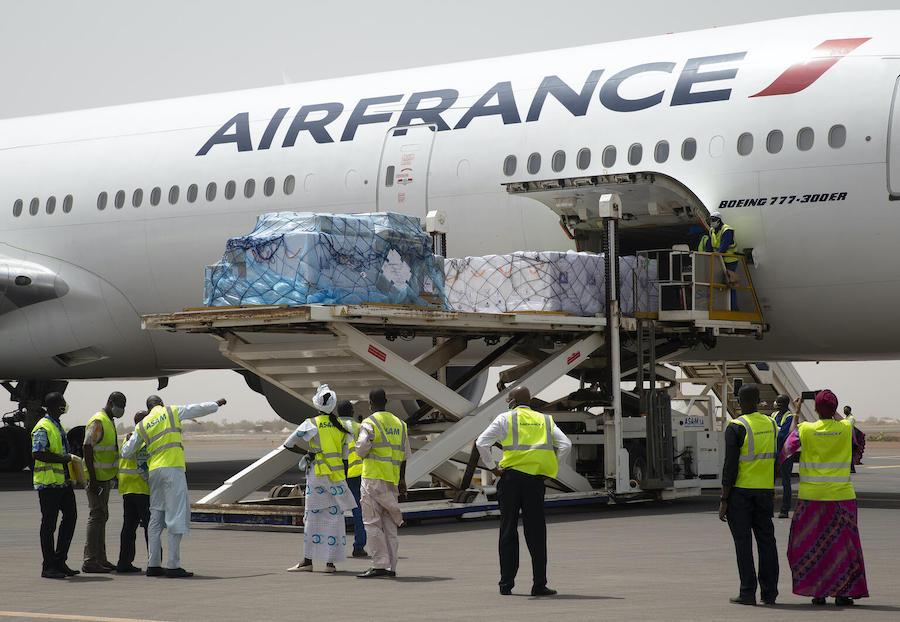
© UNICEF/UN0426388/Dicko
By the end of the first week of March 2021, nearly two dozen countries in Africa and Southeast Asia received their initial shipments of COVAX-supplied COVID-19 vaccines — marking the much-anticipated beginning of the end of the pandemic. Above, 396,000 doses touch down at Keita International Airport in Bamako, Mali, on March 5.
UNICEF, working through the COVAX Facility, is committed to providing close to 2 billion doses to 180 countries and territories by the end of 2021. “The only way out of this pandemic is to ensure vaccination is available around the globe, and that people from less wealthy countries are not left behind in the race to be protected," Fore says.
COVID-19 vaccinations ramp up worldwide
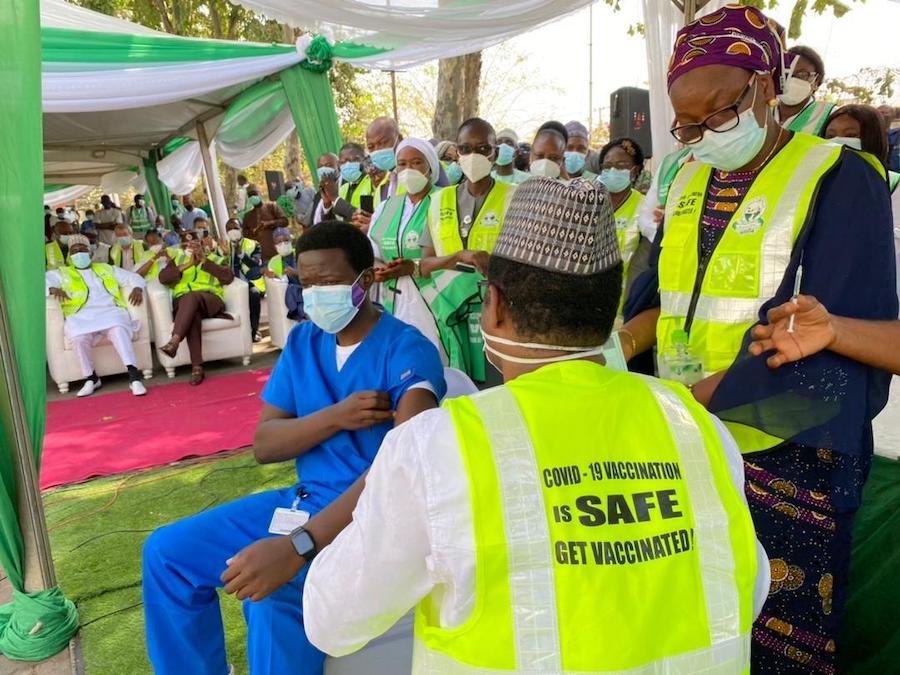
© UNICEF/UN0426247/Akau
As of March 5, more than 279 million doses of coronavirus vaccine had been administered across 111 countries, focusing on frontline and health workers and other high-risk individuals. Above, Dr. Cyprian Ngong, in blue, becomes the first male health worker in Nigeria to be vaccinated as the country kicks off its vaccination campaign following the delivery of 4 million doses from COVAX. (Dr. Ngong has worked in the isolation ward at National Hospital in Abuja since March 2020.) The safety messaging on the back of the vaccinator's vest shows how communicating critical information — and fighting misinformation — remains an integral part of the vaccination effort.
"When we talk about vaccines arriving in countries, we need to recognize what this also represents for children – it is hope," Fore says. "As vaccinations roll out, this will help to bring the pandemic under control so that we can start the work to build a better, safer and healthier future for everyone."
Your generous contribution will support UNICEF's response to the COVID-19 pandemic. Donate today.
Top photo: A nurse at Buéa Regional Hospital in Buéa, southwest Cameroon, flashes a "V for vaccinated" sign showing that she has received a coronavirus vaccine. © UNICEF/UN0419318/Dejongh
